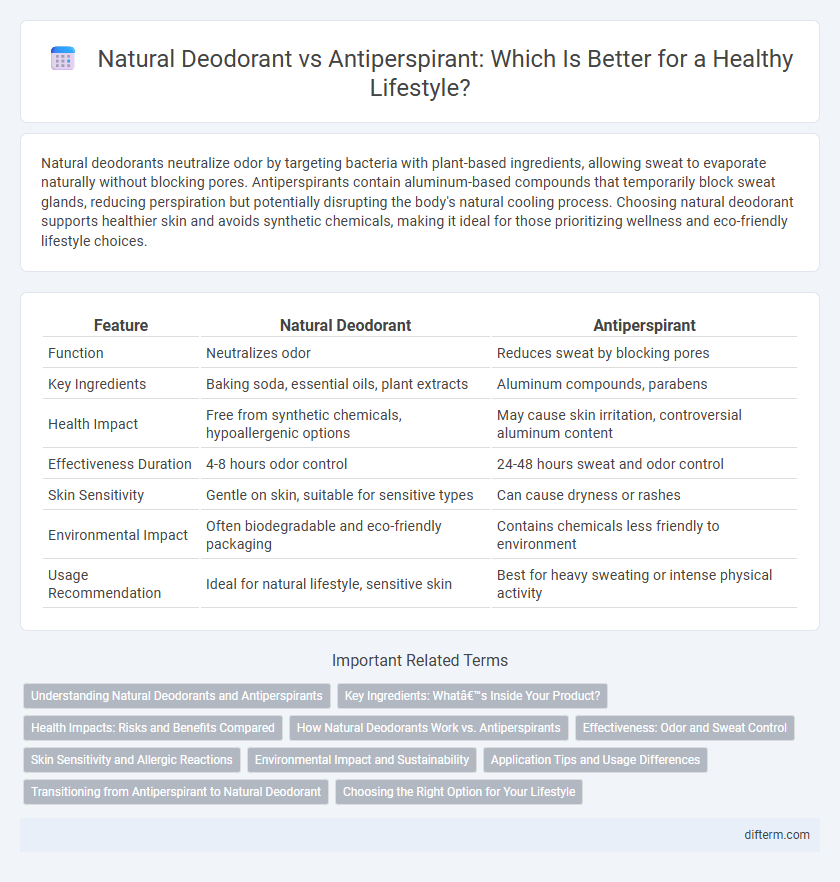Natural deodorants neutralize odor by targeting bacteria with plant-based ingredients, allowing sweat to evaporate naturally without blocking pores. Antiperspirants contain aluminum-based compounds that temporarily block sweat glands, reducing perspiration but potentially disrupting the body's natural cooling process. Choosing natural deodorant supports healthier skin and avoids synthetic chemicals, making it ideal for those prioritizing wellness and eco-friendly lifestyle choices.
Table of Comparison
| Feature | Natural Deodorant | Antiperspirant |
|---|---|---|
| Function | Neutralizes odor | Reduces sweat by blocking pores |
| Key Ingredients | Baking soda, essential oils, plant extracts | Aluminum compounds, parabens |
| Health Impact | Free from synthetic chemicals, hypoallergenic options | May cause skin irritation, controversial aluminum content |
| Effectiveness Duration | 4-8 hours odor control | 24-48 hours sweat and odor control |
| Skin Sensitivity | Gentle on skin, suitable for sensitive types | Can cause dryness or rashes |
| Environmental Impact | Often biodegradable and eco-friendly packaging | Contains chemicals less friendly to environment |
| Usage Recommendation | Ideal for natural lifestyle, sensitive skin | Best for heavy sweating or intense physical activity |
Understanding Natural Deodorants and Antiperspirants
Natural deodorants neutralize odor by targeting bacteria without blocking sweat glands, promoting healthier skin and allowing natural perspiration. Antiperspirants contain aluminum-based compounds that temporarily block sweat pores to reduce sweat production but may disrupt the body's natural detoxification process. Choosing between the two depends on personal preference, skin sensitivity, and concerns about chemical exposure.
Key Ingredients: What’s Inside Your Product?
Natural deodorants typically contain ingredients like baking soda, arrowroot powder, and essential oils to neutralize odor and absorb moisture without blocking sweat glands. Antiperspirants rely on aluminum-based compounds, such as aluminum chlorohydrate, to temporarily block sweat pores and reduce perspiration. Understanding these key ingredients helps consumers make informed choices based on their preferences for skin sensitivity, effectiveness, and health concerns.
Health Impacts: Risks and Benefits Compared
Natural deodorants contain plant-based ingredients that neutralize odor without blocking sweat glands, reducing exposure to aluminum compounds linked to potential hormonal disruption and skin irritation. Antiperspirants effectively reduce sweating by temporarily blocking sweat glands with aluminum salts but may increase the risk of clogged pores and skin sensitivity in some individuals. Choosing natural deodorant supports skin health and minimizes chemical intake, while antiperspirants offer stronger sweat control but may pose long-term health concerns for sensitive users.
How Natural Deodorants Work vs. Antiperspirants
Natural deodorants neutralize odor by using ingredients such as baking soda, essential oils, and plant extracts to kill bacteria and absorb moisture without blocking sweat glands. Antiperspirants contain aluminum-based compounds that temporarily block sweat pores to reduce perspiration. While antiperspirants control both odor and wetness, natural deodorants primarily focus on odor control through antimicrobial and absorbent properties.
Effectiveness: Odor and Sweat Control
Natural deodorants primarily target odor by neutralizing bacteria responsible for body smell, offering effective odor control without blocking sweat glands. Antiperspirants use aluminum-based compounds to temporarily block sweat pores, providing more reliable sweat reduction alongside odor prevention. Effectiveness varies per individual, with natural deodorants favored for breathability and antiperspirants preferred for maximum sweat control.
Skin Sensitivity and Allergic Reactions
Natural deodorants are formulated with plant-based ingredients and essential oils, reducing the risk of skin irritation and allergic reactions common with synthetic chemicals found in antiperspirants. Antiperspirants contain aluminum compounds that block sweat glands but can cause sensitivity, redness, or rashes in individuals with delicate skin. For those prone to allergies or eczema, choosing fragrance-free, hypoallergenic natural deodorants helps maintain skin health while controlling odor without harsh chemicals.
Environmental Impact and Sustainability
Natural deodorants often contain biodegradable ingredients like baking soda, coconut oil, and essential oils, making them more environmentally friendly compared to antiperspirants that include aluminum compounds and synthetic chemicals which can persist in the ecosystem. Antiperspirant production and disposal contribute to higher carbon footprints due to energy-intensive manufacturing and non-biodegradable packaging waste. Choosing natural deodorants supports sustainability by reducing toxic runoff and promoting compostable or recyclable packaging options that lessen landfill impact.
Application Tips and Usage Differences
Natural deodorants require application to clean, dry skin and may need reapplication throughout the day for effective odor control, especially after sweating. Antiperspirants are best applied at night to allow aluminum-based compounds to block sweat glands, reducing perspiration the next day. Users should avoid applying antiperspirants immediately after shaving or on broken skin to prevent irritation, while natural deodorants generally have a gentler formulation suitable for sensitive skin.
Transitioning from Antiperspirant to Natural Deodorant
Transitioning from antiperspirant to natural deodorant involves allowing your body time to adjust to the absence of aluminum-based blockers, which typically suppress sweat glands. During this detox period, increased sweating and odor may occur as your skin microbiome rebalances and toxin release normalizes. Choosing natural deodorants with ingredients like baking soda, arrowroot powder, and essential oils supports odor control while promoting healthier, less irritated underarms.
Choosing the Right Option for Your Lifestyle
Natural deodorants offer a chemical-free alternative that neutralizes odor while allowing sweat glands to function normally, making them ideal for those seeking a more holistic lifestyle. Antiperspirants use aluminum-based compounds to block sweat production, providing long-lasting dryness and odor control, which suits active individuals or those in high-intensity environments. Selecting the right option depends on personal preferences, skin sensitivity, and daily activity levels to balance comfort and effectiveness.
natural deodorant vs antiperspirant Infographic

 difterm.com
difterm.com